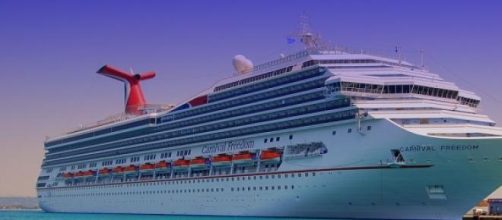The cruise is a symbol of status, pleasure and a life of luxury and joy. Anyone who enjoys a cruise is finding a means to side-step The Human Condition i.e. existential angst. The cruise provides the escape and distraction to supress what it means to be human, with an inauthentic experience.
In Baudrillard's terms, the cruise might be a simulation or a simulacra experience; but I'll come back to this. It is not only the experience that is inauthentic and manufactured, but the turn toward the cruise. The Cruise pacifies the existential angst that defines the human condition, by producing a false purpose or meaning.
The existential dilemma at the heart of being human, is what is the point of carrying-on? Living is hard work, right?! So, why bother with it?
The cruise is a perfect subterfuge for the existential question. Quite simply, the cruiser says, "I cannot die, because I have a cruise booked for 6 months hence". The forthcoming possibility of the cruise eliminates the existential dilemma, since purpose and meaning is thrust forward to the forthcoming cruise. One has a reason for living, and that is because one wants to go on a cruise. In itself, this may not be an inauthentic response to existential angst, but only if the would-be cruiser, was able to see that there life was ultimately without purpose and futile, and that they were embarking on a cruise in order to fill the void.
I doubt this level of irony is common on cruise ships.
Existentialism is often associated with atheism. And again, the cruise once it has begun provides the direction, purpose and meaning of a religious experience. The cruiser accepts that the ship is finding direction - they become passive in allowing their destination to be obtained whilst merely gazing at the sea and sunset.
The Ship's Captain role is filled with symbolic quasi or secularised religious symbology, as he provides the direction and proposes the hope that The Promised Land will be reached, whilst The Captain's Table becomes entrapped in its own mystique and special privileged status. And the Ship's Crew complete the religious experience by assisting the Ship to pass through the troubled seas to the peaceful shore.
In Sartean sense, the cruise provides a solution to existential angst, but it is a vapid, inauthentic one.
It is in Baurdrillard's language a simulation of voyage of discovery, since it mimics a real voyage of discovery, but all the travellers are fully aware that the ship will not fall of the end of the earth, or that they'll have the misfortune to land on an island inhabited by cannibals, or any of the other fears that the original voyagers of discover experienced. However, it is also simulacra of voyage of discovery, because it blurs the real and false, since the cruisers really are visiting and exploring new places and experiences, and meeting new people.
None of this is really meant as a critique of The Cruise, or Cruise Industry.
If you enjoy a cruise, good for you. But I am left feeling that it would not alleviate the existential angst that I perceive. All of which brings me to Mill's dictum "Is it better to be Socrates dissatisfied, or The Fool satisfied?". Mill concluded that he would rather be Socrates dissatisfied, and is difficult as this may be, I tend to agree. It means really acknowledging The Human Condition, and not subverting it with an inauthentic response that provides vapid purpose.

